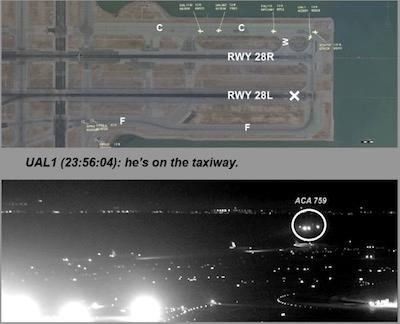Fri, Sep 28, 2018
NTSB Findings On Taxiway Overflight Shines Light On Need To Do More
The largest non-governmental aviation safety organization in the world, the Air Line Pilots Association, Int’l (ALPA), commends the National Transportation Safety Board (NTSB) for its recommendation that Canada strengthen its regulations on flight and duty time to better address pilot fatigue—a move that would enhance safety and help prevent future aviation accidents and incidents. The NTSB’s recommendations were part of the Board’s report following its investigation of the 2017 Air Canada taxiway overflight at San Francisco International Airport.

Canada’s current pilot fatigue rules lag drastically behind the rest of the world. In 2014, long-overdue draft regulations that would have brought Canada’s flight- and duty-time regulations in line with international standards were released. However, due to pressure from some industry stakeholders to slow the regulatory process and delay implementation, those new regulations have still not been enacted. ALPA maintains that safety risks will unnecessarily continue for those who work in the industry and for those who travel by air until adequate rules are finalized.
“Science-based flight-time, duty-time, and minimum rest requirements are some of the most important aviation safety initiatives for flight crews in Canada, and new rules to address the issue of pilot fatigue are long overdue. The NTSB’s recommendations today make clear that the time to act is now, and ALPA urges the Canadian government to move forward with enacting regulations that address this issue and improve aviation safety,” said Capt. Tim Canoll, ALPA president.
"Canada lags far behind the rest of the world when it comes to ensuring our pilots are well-rested when they are flying. Airline pilots, crews, and passengers deserve to work and travel in the safest environment possible, which is, in part, accomplished by implementing rules that are science-based, supported by data, and recognize safety as the priority," said ALPA Canada president Capt. Dan Adamus. "Therefore, we ask that the government adopt the proposed science-based regulations currently pending before the Treasury Board without further delay. While the proposed regulatory update does not reflect all of our concerns, we do acknowledge that because Canada is currently so drastically behind the rest of the world, they are a significant improvement to safety in the Canadian airline industry.”
(Source: ALPA news release. Image from file)
More News
Circle To Runway (Runway Number) Used by ATC to inform the pilot that he/she must circle to land because the runway in use is other than the runway aligned with the instrument appr>[...]
Aero Linx: National Aviation Safety Foundation (NASF) The National Aviation Safety Foundation is a support group whose objective is to enhance aviation safety through educational p>[...]
At Altitude Of About 250-300 Ft Agl, The Airplane Experienced A Total Loss Of Engine Power On November 6, 2024, at 1600 central standard time, a De Havilland DHC-1, N420TD, was inv>[...]
From 2009 (YouTube Edition): Three Hour Flight Was 'Flawless' -- At Least, Until Mother Nature Intervened For anyone who loves the aviation business, this was a VERY good day. Afte>[...]
Also: AMA Names Tyler Dobbs, More Falcon 9 Ops, Firefly Launch Unsuccessful, Autonomous F-16s The Air Force has begun ground testing a future uncrewed jet design in a milestone tow>[...]
 ANN's Daily Aero-Term (05.05.25): Circle To Runway (Runway Number)
ANN's Daily Aero-Term (05.05.25): Circle To Runway (Runway Number) ANN's Daily Aero-Linx (05.05.25)
ANN's Daily Aero-Linx (05.05.25) NTSB Prelim: De Havilland DHC-1
NTSB Prelim: De Havilland DHC-1 Classic Aero-TV: The Boeing Dreamliner -- Historic First Flight Coverage
Classic Aero-TV: The Boeing Dreamliner -- Historic First Flight Coverage Airborne-NextGen 05.06.25: AF Uncrewed Fighters, Drones v Planes, Joby Crew Test
Airborne-NextGen 05.06.25: AF Uncrewed Fighters, Drones v Planes, Joby Crew Test



